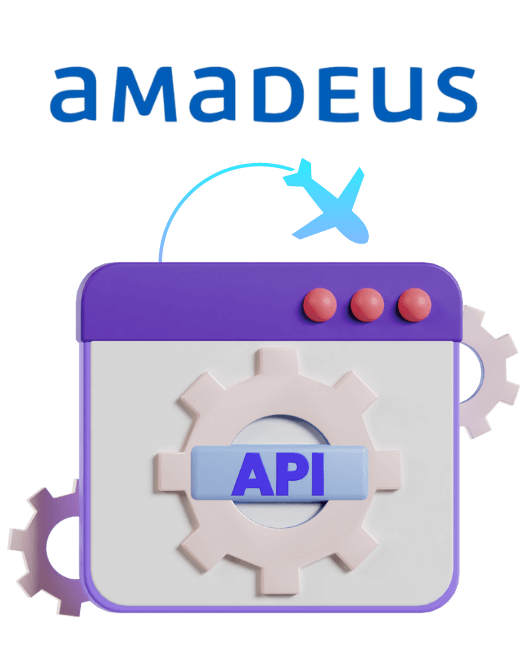About Amadeus API Integration

Set up in 1987 by Air France, Iberia, Lufthansa and SAS, Amadeus GDS is a globally influential distribution systems having a market share over 40 percent. Initially started as a European substitute for the American's Sabre GDS, it now serves travel businesses in 190 countries. Amadeus API suite enables effortless booking, price comparisons, and individualised travel experiences.
Amadeus booking api supports wide range of th clients, including online travel agencies (OTAs), travel management companies (TMCs), host travel agencies, air consolidators, and various digital travel sellers among its clientele, Amadeus facilitates the exploration, comparison, and booking of inventory through a suite of application programming interfaces (APIs). These include the following:
- The flight booking APIs grant access to the deals of more than 400 airlines, including 130 low cost carriers, and ancillary services of 150 airlines and fare families of over 100 airlines.
- Besides the above, Amadeus hotel booking APIs effortlessly link to a network of more than a million hotel properties from 15000 providers which makes him Amadeus. Inc. And tech travel leader.
- For tours and activities, Amadeus booking system provides tours and activities APIs and integrates information from 101 tour operators. To cater for mobility, car rental APIs connect with 75 suppliers serving about 1800 cities.
- Rail Booking APIs: Railfans are able to enjoy the benefits that come with these rail booking APIs that incorporate content from 90 rail operators.
- Travel Insurance APIs: booking and shopping for travel insurance is now easier with Amadeus travel insurance APIs from 22 insurance companies. Apart from the details mentioned above, a range of other Travel APIs add to the extensive portfolio of Amadeus.
Amadeus booking system blazed a trail by using APIs back in 2000, and today, they provide various APIs for web and mobile apps, categorized into Self-Service and Enterprise options. The OneClick IT Consultancy team boasts hands-on experience collaborating with both classifications. In the following sections, we'll delve into the distinctive attributes of each group and elucidate the requisites for seamlessly integrating these APIs into your project.
Growth of OneClick IT Consultancy
- 12+Years of Experience
- 700+Project Deployment
- 150+Expert Developers
- 40+Active Clients
- 30+Frameworks
Modernize Your Business with Amadeus Travel API Integration
Self-Service APIs
The Self-Service API Catalog: Unveiling Content and Functionality
Building Integrations with Self-Service APIs
Transitioning to Production: Ensuring App Viability
The Crucial Role of Airline Consolidators in Flight Booking Apps
Finding Assistance in Your Integration Journey
Pricing Conditions for Self-Service Subscription
The Self-Service API Catalog: Exposing Structure and Purpose

Beginning in 2024, Amadeus’s Self-Service Suite has 37 APIs which are organized into five groups.
Air APIs assist with booking automation and offer features like seat selection, economically inspiring flight destination discovery from a particular city, and more. These APIs also enable advanced features such as autocomplete airport search, local travel habit insights (for example, most booked destinations or busiest traveling periods), and local flight price analysis based on historical data from the Amadeus booking system.
Hotel APIs fully automated the hotel booking flow while augmenting search results with ratings and providing autocomplete suggestions for enhanced search.
Destination Content amadeus booking api provide extensive information about premier attractions, tours, and activities in a given location. Users can also access popularity scores based on specific latitude and longitude coordinates. Destinations are meticulously evaluated across four parameters: sightseeing, restaurants, nightlife, and shopping.
Trip APIs utilize artificial intelligence to identify whether a user is scheduling a trip for business or leisure purposes, which helps in personalizing the user’s past search patterns and bookings.
COVID and Travel Safety APIs allow retrieval of detailed safety data for 40,000 cities and COVID-19 travel restrictions for 200 countries. Recently, the rapidly growing travel planning platform Trip.com integrated Amadeus safety content. This integration allows them to provide critical information regarding entry testing and quarantine requirements at the airports they serve. Using the Amadeus airport API, Trip.com and others can track safety measures and give up-to-the-minute information on specific airport protocols.
Integrating the Amadeus API PHP toolkit’s provided solutions directly links developers to these advanced travel intelligence tools. For businesses seeking to advance their travel platforms while strategically controlling expenses, knowing the Amadeus Enterprise API pricing is crucial.
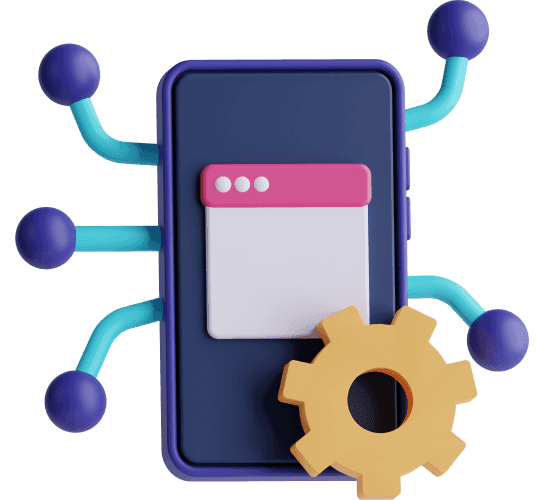
Building Integrations with Self-Service APIs
Initiating collaborations with Self-Service APIs is a straightforward process. To commence, set up an account and, upon confirmation, generate an access token that serves as verification for your authorization as a developer.
Amadeus booking algo supports engineers with the aid of an elaborate toolkit like a test setting, sample code, and sdk’s which make adding the APIs easier. Check the official GitHub repository for the libraries that help implement APIs for multiple languages like Ruby, Python, Java, Node.js, .NET, Kotlin (for Andriod), and Swift (for iOS).
No matter what programming language is chosen, developers are able to further customize the integration by testing in a sandbox environment. Amadeus gives a set allowance of free API calls each month which can be from 200 to 10,000 depending on the API. The system allows your application to make one call every 100 milliseconds.
Furthermore, Amadeus Booking Software comes with pre-made booking pipelines for flights and hotels which are simple to use. These pipelines are well thought out and consist of three back to back calls in a single smooth and effortless sweep.
Search: This step provides best value flights or list of hotels which will be used for the booking.
Price: In this step, the Price call is made. In this moment, the availability and prices of the chosen flight as well as the hotel’s rates and their terms are retrieved. This step guarantees that users are up-to-date before proceeding any further.
Book: The last step of the pipeline is called Book which is responsible for creating flight orders. In case of hotels, a reservation is made in the hotel’s property management system. This seamless finalization completes the booking and connects users to the travel services they selected.
While following this flow, developers focus on a single object (request) which they can change in each step. Developing with the Amadeus booking API is streamlined compared to traditional methods of creating requests because this process eliminates the need for every step of the procedure to have separate requests created for them.
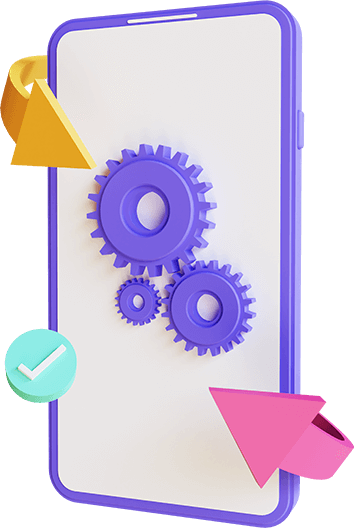
Moving an Application to a Live Environment: Confirming its Functionality
The process of transitioning your application to a live environment is referred to as production. Within this step, the system will be able to collect a wide range of real data and utilize unlimited feature calls.
This step further comprises of two sub-sections:
- Obtaining Production Key:
Fill all sections of the provided personnels and billing details template.
Pick one of the listed methods of payment.
Accept, by signing the Terms of Service document on DocuSign.
- Provisioning validation and Personal Environment:
The Amadeus booking software development team allocates pre-defined period of up to 72 hours to validate the submitted application and set up custom environment.
The time allocated for subsequent applications is significantly reduced to few hours.
An automated email is subsequently sent containing grant of validation, thus production access.
This process is uniform across all Self-Service applications, apart from the Flight Create Orders API – which ‘completes’ an air booking. To add this API into production, it is required that Amadeus’s guidelines are followed, local directive laws are adhered to, and the confirmation that the API will exist in your location is verified.
Most importantly, there is still an issue to address concerning signing an accord with an airline consolidator. OneClick IT Consultancy, being a specialist in the travel tech industry, assists to the fullest these PTO companies in meeting these requirements which facilitates their integration.
The Crucial Role of Airline Consolidators in Flight Booking Apps
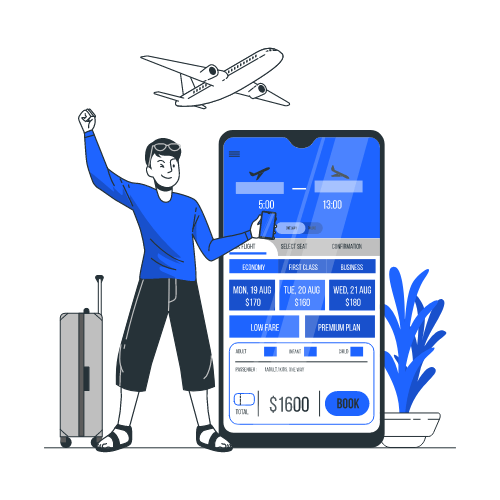
Accreditation from authoritative bodies such as the Airline Reporting Corporation (ARC) in the US or the International Air Transport Association (IATA) worldwide is indispensable for issuing flight tickets. Explore our articles on ARC Accreditation Options and How to Obtain IATA Accreditation to delve deeper into the certification process.
Essentially, smaller travel agencies and new entrants face a lack of adequate resources which restrains them from acquiring accreditation from IATA or ARC. Traditionally, this problem is solved by establishing deals with host agencies or airline consolidators who perform the ticketing for a fee. This Amadeus booking system aids those unfamiliar with the steps by helping them network with other potential intermediaries. For those already partnered with an IATA/ARC accredited collaborator, entity integration adds these additional steps of GDS approval for smooth access. This emphasizes the importance of airline consolidators in offering flight-booking apps solutions to many ticketing processes and industry accreditation problems.
Looking for Help while Integrating with our Systems

The Amadeus booking system API has well-structured API documentation that provides step-by-step instructions for easing the process of integration. Their FAQ page also adds value as new questions are being answered regularly. Unfortunately, GDS does not provide telephonic or live chat support for the Self-Service API catalog, but you can submit your queries to the Developer Relations team through the contact form. Be aware, however, that they might not respond in a timely manner. In this case, however, OneClick IT Consultancy, because of its specialization in Amadeus API Integration, provides help and guidance in Amadeus Travel API Integration by servicing businesses that require more direct support.
If you want a solution for your problem with a community-driven focus, you can ask the Amadeus for Developers community on Discord or StackOverflow, or hire OneClick IT Consultancy’s professional network. OneClick enriches this knowledge base with its practical experience in the field, and with over 300 questions posted at these platforms regarding the Amadeus API integrations. Also, OneClick can help traverse the travel tech forum Techtalks, where business questions concerning the Amadeus API integration are posed, contributing seasoned insights and valuable contributions to these discussions, alongside the guidance of OneClick experts.

Amadeus Enterprise API: The Ultimate Solution for Large Travel Businesses
For larger businesses, Amadeus Enterprise API offers advanced functionalities with SOAP and REST options. These APIs provide ticketing services, booking management, and enhanced integration with airline consolidators. In an era predating the existence of the democratic Self-Service catalog. During that time, exclusive access to GDS content through SOAP APIs, designed in 1998, was reserved for major players in the travel industry certified by ARC or IATA.
The Amadeus booking software is currently migrating from SOAP to REST, but it is still deeply reliant on SOAP for accessing enterprisegrade features. To qualify for the Enterprise subscription, a business must already be sizeable
To gain a custom pricing strategy, round-the-clock technology assistance, and a manager who personally addresses their problems, enterprise customers need more than just access to a wider range of services. This marks a change in strategy directed to Enterprise APIs which is targeted at the bigger players in the travel industry. Eligibility for Amadeus enterprise API pricing is restricted to certain businesses that hold an IATA or ARC license. A signed agreement, sandbox trials, and a development team proficient in Amadeus API integration are prerequisites for the seamless integration of systems.
Enterprise API Catalog: Comprehensive Content and Functionality Unveiled
- 1
Ticketing Services at Booking Time
The Self-Service level caters to organizations that do not have travel accreditations, thus restricting them from executing airline ticketing directly. However, enterprise clients do have the necessary credentials for both issuing and managing e-tickets. Amadeus automates every step in the ticketing process, and gives enterprise clients the option to fully control their flight bookings.
- 2
Booking Management
These REST and SOAP services allow the client to create bookings for flights and other services. Management of Personal Name Record (PNR) is simplified in respect of all operations like searching, retrieving, displaying, editing, adding, and deleting PNR elements.
- 3
Car Rentals and Transfers: Empowering Systems with SOAP APIs
In the category of car rentals, SOAP APIs within this class allow for the construction of a sophisticated car rental reservation system, or for the integration of car rentals with your Online Travel Agency (OTA).
- 4
Rail Services: Elevating Travel Platforms with SOAP APIs
A trio of SOAP APIs in the rail category stands ready to fuel the development of a standalone railway reservation system or to enrich the travel platform with a dedicated rail-related module.
Modernize Your Travel Business with Amadeus API Integration Services

Amadeus API Certification Process
Before utilizing Amadeus’s services, your application should go through the setup process which includes verification and examination of your app’s interface to their Enterprise APIs. In comparison to the Self-Service subscription, this automation step takes considerably longer, spanning weeks rather than days.
For developers, the certification process entails the following steps:
- Execute a sequence of requests modeling various standard situations, such as one-way trips, round trips, and family travel, for adults and families with children.
- Sign up for each call with your unique ID.
- Transmit the log with requests and responses to Amadeus.
- Await feedback.
- Address comments, rectify errors, and submit another log.
- Repeat the waiting process.
The waiting period typically constitutes the longest segment of the entire procedure. In-flight booking integrations, most issues and comments arise during the interval between booking and ticketing. In the Self-Service subscription, this phase is handled by an authorized consolidator, reducing the validation period to no more than three days, as per the Amadeus official website.
Encouraging news for enterprise clients engaged in flight booking is that once the primary workflow, from search to ticketing, is implemented, incorporating additional features, such as seat maps, becomes a relatively swift process.
Upon successful certification after multiple iterations, Amadeus transitions integrations to the production environment, allowing them to operate with real data.
Selectable Benefits of Amadeus Enterprise Support Services
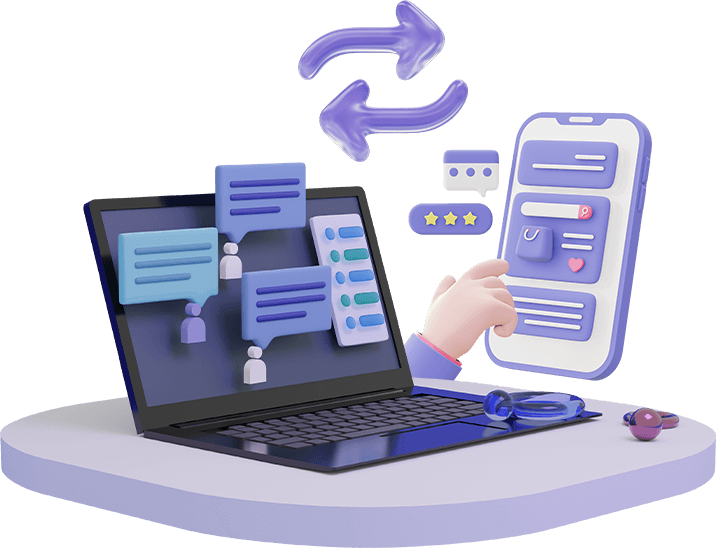
A contract or SLA with Amadeus will define the terms of technical support for your enterprise subscription.
Usually, the GDS offers the provision of a dedicated account manager and support team who stand ready to respond to your questions about configuration, account adjustments, and other assistance you may require. This means when concerns emanate during the development or production phase, you may hand over the problem to Amadeus experts and contact them through email and get a solution almost immediately.
Key Factors Before Integrating Amadeus APIs
Comparative Overview of GDS Services
Today, travel companies have to select from one of the three primary Global Distribution Systems (GDSs) which include Amadeus, Sabre, and Travelport. These systems started as flight booking systems, now they have branched out, covering various other products like hotels, car rentals, and additional services. Traditionally, U.S. based companies favored Sabre. Europe aligned with Amadeus, while Travelport was typically recommended for companies operating in Africa and the Middle East.
All three of the Global Distribution Systems (GDSs) issued have similar coverage, subscription model, and features. These differences lie within the fine details of the contracts and pricing structure offered for each specific geographical region. Therefore, it is not unusual to find American OTAs using Amadeus while their European or Middle Eastern counterparts prefer to switch to Sabre. There is often regional convergence and divergence in operational strategies.
Strategic Factors for a Secondary GDS
Today, travel companies have to select from one of the three primary Global Distribution Systems (GDSs) which include Amadeus, Sabre, and Travelport. These systems started as flight booking systems, now they have branched out, covering various other products like hotels, car rentals, and additional services. Traditionally, U.S. based companies favored Sabre. Europe aligned with Amadeus, while Travelport was typically recommended for companies operating in Africa and the Middle East.
All three of the Global Distribution Systems (GDSs) issued have similar coverage, subscription model, and features. These differences lie within the fine details of the contracts and pricing structure offered for each specific geographical region. Therefore, it is not unusual to find American OTAs using Amadeus while their European or Middle Eastern counterparts prefer to switch to Sabre. There is often regional convergence and divergence in operational strategies.
Foreseen Simplicity in GDS API Integration: A Welcome Development
Surely this is, without a doubt, the case. It seems there is a faint movement from SOAP to REST APIs in all of the Global Distribution Systems (GDSs). It is useful, however, that Amadeus REST APIs are overwhelmingly documented and easy to take advantage of.
The shift from the complex SOAP protocol to the more efficient REST APIs is still in progress, but the value of domain knowledge and practical working experience in GDS API integrations is still critical. Engineers knowledgeable about the GDS world and travel systems and processes still contribute immensely towards the development of travel applications and, therefore, significantly reduce the time and monetary expenses incurred.
Receive OneClick’s Professional Amadeus API Integration Services
Comprehensive Professional Competence
Our specialists understand the intricacies of the travel industry's workings and hold years of experience alongside profound Amadeus API knowledge. Tailor Made to Specifications With Wranglers Custom Dry Cleaning tailor made to your specific needs whatever they might be will get the attention they deserve.
Seamless Integration Process
Our design is smooth and easy to integrate, and we prefer to ensure that everything works without much complication. Every single one of the technical details is managed so you can concentrate on your business.
Customized Solutions
At our company, we design and build products that solve an issue at hand and are particular to the client’s needs a basic step that makes a world of difference. That is why our team collaborates with you to know what you want so we can achieve applicable solutions in line with your set plans.
Accurate & On-time Submission
In the travel sector, time is of utmost value. Considering your Amadeus API integration project deadlines, we guarantee its completion within the set timeline, thanks to our proficient project management skills and 'Agile' approach.
Advanced Maintenance Services
Securing integration of the required features and functions is only part of the solution. We assist you in achieving your business objectives by offering Amadeus API integration support and maintenance services even after the integration process is completed.
Protection Policies
In this regard, our top priority is the security of your data and customer information, thus allowing you to relax, knowing that your confidential information is protected and perfectly safe.

